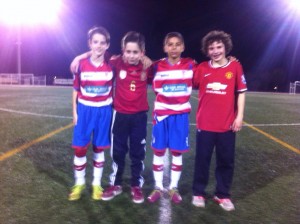
Here in Granada, Spain, the boys practiced with two teams: Albolote soccer and Granada CF youth academy. The idea was to give the boys an opportunity to learn and play the Spanish style of soccer with other boys their age. Antonio Barea Villegas, vice-president of training and methodology for international soccer training organization AddSoccer who helped coordinate the trip says this style of play is called tiki-taka, which means to “keep the ball with short passes, be patient and progress all together.”
Antonio believes that the main difference between American and Spanish soccer is that “in Spain there is a structure and a philosophy. The teams select the player who plays according to this philosophy (tiki-taka).”
Important to this philosophy is not only the player embracing the tiki-taka style, but also the development and training of Spanish coaches. Results speak for themselves. In the last 15 to 20 years, Spanish youth teams (u21, u19, u18) have won many European and world championships. The Spanish National team won the UEFA Euro Cup in 2008 and 2012, and in 2010 the World Cup – a feat that no other team in the world has ever achieved.
Even if the boys can’t execute tiki-taka all the time, there are many life lessons they are learning from playing Spanish-style soccer in Granada, especially patience and progressing together.

